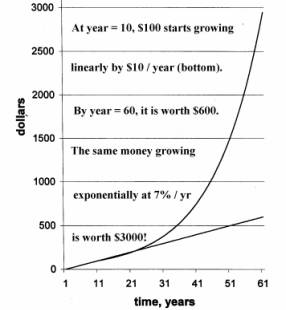|
from The Worldview Literacy Book copyright 2009 back to worldview theme(s) #22 |
| Discussion #22A: Here "Expansionism" refers to a nation's
economic (not territorial) expansion. One who embraces the policy of pushing economic growth
behind this worldview theme will not similarly value the diametrically
opposed "Sustainability" (theme #23A).
Unlike those laissez faire capitalists (who invest in theme #19),
those who like expansionism have few qualms about government
interference in an economy (which itself can be gauged by various
indicators)—as long as such meddling enhances economic growth
prospects.
In terms of increasing
production output, economic growth can be brought about by increasing
production input and/or increasing productivity.
Nationally this can be done by
1) increasing population growth (increasing eventual labor force
growth), 2) investment in economic infrastructure (land, new industrial
plants & equipment), 3) investment in human capital, 4) beneficial
technological change, and 5) improving the political, and socioeconomic
climate. With respect to
investment, it is generally thought if a nation maintains essentially
full employment and keeps inflation in check, its rate of economic
growth should be directly related to the % of its gross domestic product
that is reinvested back in the ways noted above.
The % increase in real
gross domestic product (GDP) per capita is typically used (as a first
approximation) to measure how fast economies are growing.
The extent to which this gauges real increases in standard of
living is debatable. Critics
point out that GDP includes not just economic "goods" but some
"bads," omits distribution of income considerations, doesn't
include things like the leisure time people have, etc.
In attempting to "heat up" their economies, nations
must watch inflation. Indeed,
economic growth per capita in the 5% to 10% / year range, if maintained
in the long run, results in doubling of economic output per capita in
seven to fourteen years (see Figure #22b), but often causes dramatic
price rises! Interest rates
also need watching, since low rates can spur investment.
Critics charge economic growth increases
inequality: that the share of the "economic pie" "have
nots" get decreases. Expansionists
say the solution is to grow the pie.
Since Malthus' 1798 essay arguing populations grow exponentially
while resources to support them grow linearly (see Figure #22a), many
have noted that growth can deplete non-renewable resources rapidly.
By the 1970s, environmentalists charged that expansionists failed
to appreciate natural "limits to growth." They expressed concerns that human society could, like
other species in stressed eco-systems, "overshoot and
collapse." Growing
consumerism and associated resource use & pollution added to their
fears. Fast forward to 2009 and global economic
crisis. After many lessons in how technological developments can
dramatically change market conditions and in the dangers of unregulated
financial speculation, many
former pro-growthers feel the
|
Discussion—continued booming "business as usual"
era of recent decades—driven by
consumer spending—may be over.
Besides enormous debt and rising unemployment in the affluent
world, there are global concerns: 1)
failed nations mired in poverty or inequality breed terrorism
threatening everyone; 2) world-wide oil production may be at or near its peak, 3)
global climate change concerns.
They seem increasingly willing to consider the changes that those
respecting "Ethical Globalization" (theme #51) and
"Environmental Economics" (theme #40) suggest.
#22B: Promoters
of imperialistic global capitalism won't make such concessions.
Globalization, they argue, has benefited the developing
world—lifting hundreds of millions out of extreme poverty, increasing
life expectancies, decreasing child mortality, boosting literacy, etc.
They point to the transformation of China from near basket case
to near economic superpower. They
believe governments and
corporations extending power & influence over those in other
countries is fundamentally good. Their intervention philosophy is
built on ethnocentrism, and on the assumption that, given the
backwardness of the people affected, such domination will greatly spur
economic development. They argue an earlier era of European
colonialism in Asia and Africa had lasting benefits.
As for environmental concerns, they feel that energy, mining, and
timber companies need to go wherever oil, natural gas, timber and other
valuable natural resources are found, make arrangements with local
governments to facilitate timely resource extraction, and bring them to
market. "People need jobs and the world needs energy and natural
resources. Everyone can be
happy!" they argue.
Figure
#22a: Linear vs.
Exponential Growth
Figure
#22b: Growth Rate vs. Doubling Time
|
